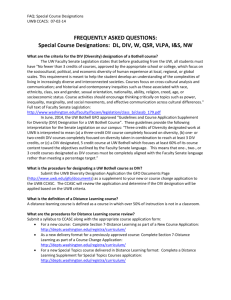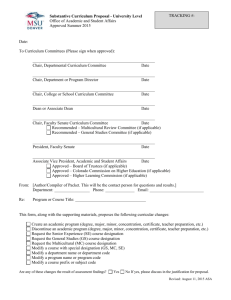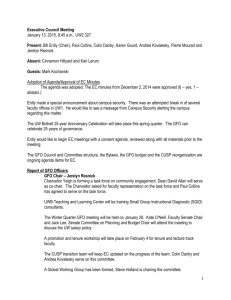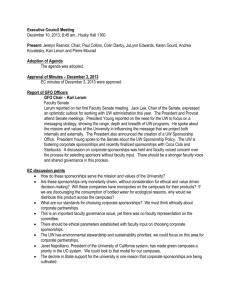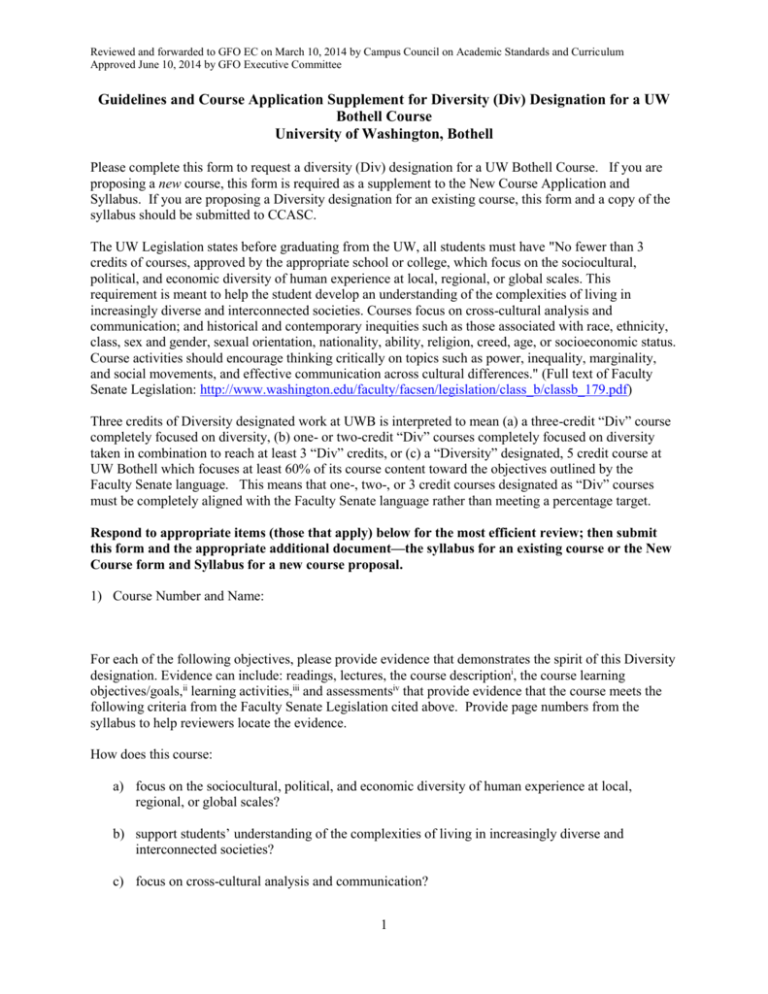
Reviewed and forwarded to GFO EC on March 10, 2014 by Campus Council on Academic Standards and Curriculum
Approved June 10, 2014 by GFO Executive Committee
Guidelines and Course Application Supplement for Diversity (Div) Designation for a UW
Bothell Course
University of Washington, Bothell
Please complete this form to request a diversity (Div) designation for a UW Bothell Course. If you are
proposing a new course, this form is required as a supplement to the New Course Application and
Syllabus. If you are proposing a Diversity designation for an existing course, this form and a copy of the
syllabus should be submitted to CCASC.
The UW Legislation states before graduating from the UW, all students must have "No fewer than 3
credits of courses, approved by the appropriate school or college, which focus on the sociocultural,
political, and economic diversity of human experience at local, regional, or global scales. This
requirement is meant to help the student develop an understanding of the complexities of living in
increasingly diverse and interconnected societies. Courses focus on cross-cultural analysis and
communication; and historical and contemporary inequities such as those associated with race, ethnicity,
class, sex and gender, sexual orientation, nationality, ability, religion, creed, age, or socioeconomic status.
Course activities should encourage thinking critically on topics such as power, inequality, marginality,
and social movements, and effective communication across cultural differences." (Full text of Faculty
Senate Legislation: http://www.washington.edu/faculty/facsen/legislation/class_b/classb_179.pdf)
Three credits of Diversity designated work at UWB is interpreted to mean (a) a three-credit “Div” course
completely focused on diversity, (b) one- or two-credit “Div” courses completely focused on diversity
taken in combination to reach at least 3 “Div” credits, or (c) a “Diversity” designated, 5 credit course at
UW Bothell which focuses at least 60% of its course content toward the objectives outlined by the
Faculty Senate language. This means that one-, two-, or 3 credit courses designated as “Div” courses
must be completely aligned with the Faculty Senate language rather than meeting a percentage target.
Respond to appropriate items (those that apply) below for the most efficient review; then submit
this form and the appropriate additional document—the syllabus for an existing course or the New
Course form and Syllabus for a new course proposal.
1) Course Number and Name:
For each of the following objectives, please provide evidence that demonstrates the spirit of this Diversity
designation. Evidence can include: readings, lectures, the course descriptioni, the course learning
objectives/goals,ii learning activities,iii and assessmentsiv that provide evidence that the course meets the
following criteria from the Faculty Senate Legislation cited above. Provide page numbers from the
syllabus to help reviewers locate the evidence.
How does this course:
a) focus on the sociocultural, political, and economic diversity of human experience at local,
regional, or global scales?
b) support students’ understanding of the complexities of living in increasingly diverse and
interconnected societies?
c) focus on cross-cultural analysis and communication?
1
Reviewed and forwarded to GFO EC on March 10, 2014 by Campus Council on Academic Standards and Curriculum
Approved June 10, 2014 by GFO Executive Committee
d) teach about historical and contemporary inequities such as those associated with race, ethnicity,
class, sex and gender, sexual orientation, nationality, language, ability, religion, creed, age, or
socioeconomic status. (Issues related to a specific discipline do not meet the diversity focus
unless the focus is on a specific group within the discipline, for example, women in science or
people of color in computer programming).
e) encourage thinking critically related to “power,” “inequality,” “marginality,” “oppression,” and
“social movements?”
f) develop skills for effective communication across cultural differences?
2) Considering the evidence provided above, what percentage of this course would you estimate is
focused on diversity?
APPROVALS
Signatures
Director/Dean of
School or Program
UWB CCASC Chair
2
Date
Reviewed and forwarded to GFO EC on March 10, 2014 by Campus Council on Academic Standards and Curriculum
Approved June 10, 2014 by GFO Executive Committee
Supplemental Information
The following information is intended to provide example responses to the prompts on the “Guidelines and
Course Application Supplement for Diversity (D) Designation for a UW Bothell Course” form.
i
Sample catalog description: This course provides an introduction to theories, concepts, research, and
polices that will provide a foundation for exploring connections between diversity and equity and for
recognizing ways in which these connections are relevant to individuals, institutions, and the world.
ii
Sample learning objective: Students will be able to connect current issues of diversity and equity to
historical contexts (e.g. exploring the historical context of Brown v. Board of Education of Topeka,
Kansas (1954), the influence of Brown and the civil rights movement on many groups, and how Brown is
currently used in support of the banning of ethnic studies in Arizona).
iii
Sample learning activities: The content and goals of the course require that all participants are actively
engaged and prepared to create a safe community for the exploration of some of the most fundamental
issues facing individuals, groups, society, and institutions. Course participants will be expected to come
to class prepared to discuss various interpretations of texts rather than waiting to hear the instructor’s
lectures on the readings. Group work, critical reflection, and tools of inquiry will be regular features of
instruction.
iv
Autoethnography Paper (approximately midterm due date; 5-8 pages double-spaced)
For this paper you need to
use frameworks, theories and hypotheses from course readings to explore your process of
development in the context of understanding issues of diversity and social justice
discuss your experiences and education (in and outside of school) in a broad context and in relation to
ideas and others (e.g., consider your personal experiences with cultural conditioning, issues of power,
and advantages and disadvantages based on characteristics such as race, gender, class, sexual identity,
language, abelism)
adhere to principles of autoethnography (e.g., include descriptions that reflect emotions as well as
experiences and tell stories with a specific purpose)
theorize on the use of autoethnography as a learning strategy (its value and its limitations)
3

